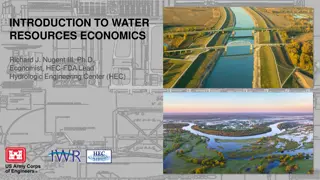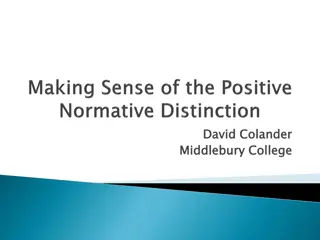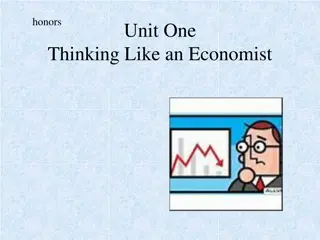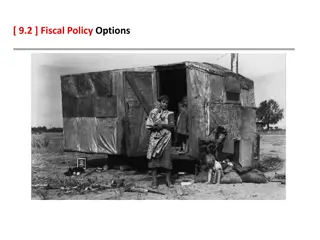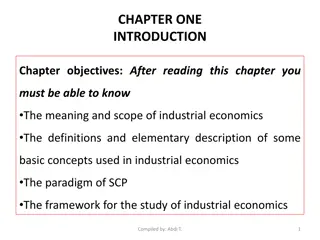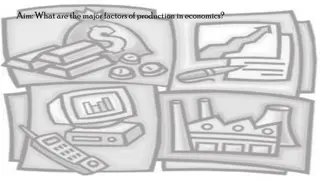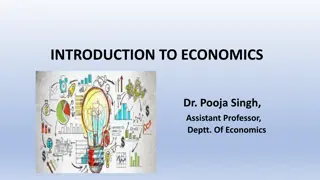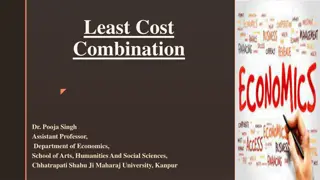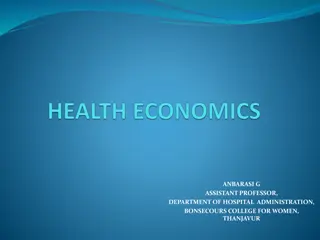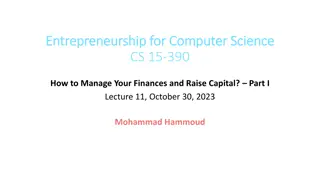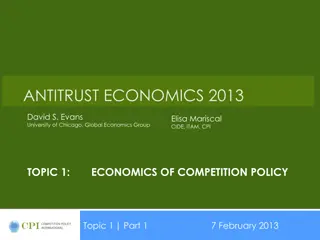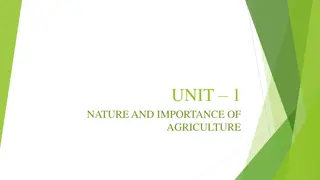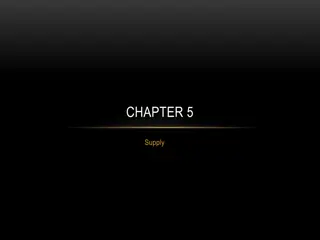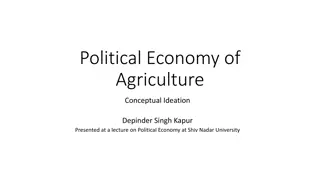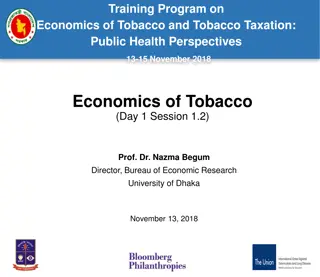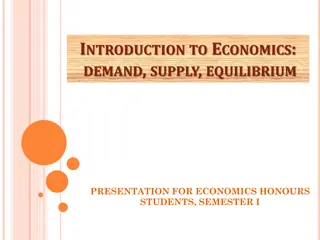Understanding Economics: Key Concepts and Importance in Society
Economics, derived from the Greek word "oikonomos," explores how individuals and societies manage scarcity. Learning economic principles can enhance decision-making, financial literacy, and policy shaping. Key ideas like tradeoffs, rational choices, incentives, and market organization are fundamental in economic thinking. The discipline provides insights into resource allocation, the impact of government actions, and the relationship between inflation and unemployment.
Download Presentation

Please find below an Image/Link to download the presentation.
The content on the website is provided AS IS for your information and personal use only. It may not be sold, licensed, or shared on other websites without obtaining consent from the author. Download presentation by click this link. If you encounter any issues during the download, it is possible that the publisher has removed the file from their server.
E N D
Presentation Transcript
The word economy comes from the Greek word oikonomos, which means one who manages a household. A household faces many decisions. It must decide which household members do which tasks and what each member receives in return: Who cooks dinner? Who does the laundry? Who gets the extra dessert at dinner? Who gets to drive the car? Like a household, a society faces many decisions. It must find some way to decide what jobs will be done and who will do them. It must also allocate the goods and services they produce.
Why should I care about economics? Economics affects everyone s lives. Learning about economic concepts can help you to understand your choices, the market, the news, make financial decisions, shape public policy, and see the world in a new way. Prepared by Ms. Khadija Alaa, FASE, Ishik University
Economics It s the study of scarcity, the study of how people use resources and respond to incentives, or the study of human choice. Economics is the social science that studies the choices that individuals, businesses, governments, and entire societies make as they cope with scarcity and the incentives that influence and reconcile those choices. Prepared by Ms. Khadija Alaa, FASE, Ishik University
Key ideas define the economic way of thinking: 1) 2) 3) 4) 5) 6) 7) 8) A choice is a tradeoff because of scarcity. People make rational choices by comparing benefits and costs. Most choices are how-much choices made at the margin. Choices respond to incentives. Trade can make everyone better off. Markets are usually a good way to organize economic activity. Governments can sometimes improve market outcomes. A country s standard of living depends on its ability to produce goods and services. Prices rise when the government prints too much money. Society faces a short-run trade-off between inflation and unemployment. 9) 10) Prepared by Ms. Khadija Alaa, FASE, Ishik University
A choice is a tradeoff because of scarcity To get something that we like, we usually have to give up something else that we also like. Making decisions requires trading off one goal against another. Consider a student who must decide how to allocate her most valuable resource her time. She can spend all of her time studying economics, spend all of it studying math, or divide it between the two fields. Time is a scarce resource. Prepared by Ms. Khadija Alaa, FASE, Ishik University
Scarcity Scarcity The management of society s resources is important because resources are scarce. Scarcity means that society has limited resources and therefore cannot produce all the goods and services people wish to have. Just as each member of a household cannot get everything she wants, each individual in a society cannot attain the highest standard of living to which she might aspire. Prepared by Ms. Khadija Alaa, FASE, Ishik University
People make rational choices by comparing benefits and costs. Because people face trade-offs, making decisions requires comparing the costs and benefits of alternative courses of action. In many cases, however, the cost of an action is not as obvious as it might first appear. Prepared by Ms. Khadija Alaa, FASE, Ishik University
Opportunity Opportunity Cost Cost The opportunity cost of something is the highest- valued alternative that must be given up to get it. What is your opportunity cost of going to a caf with friends? Prepared by Ms. Khadija Alaa, FASE, Ishik University
Most choices are how-much choices made at the margin. To make a choice at the margin, you evaluate the consequences of making incremental (small or tiny) changes in the use of your time. Rational people often make decisions by comparing marginal benefits and marginal costs. When exams roll around, your decision is not between blowing them off and studying twenty-four hours a day but whether to spend an extra hour reviewing your notes instead of watching TV. Prepared by Ms. Khadija Alaa, FASE, Ishik University
Choices Respond to Incentives A change in marginal cost or a change in marginal benefit changes the incentives that we face and leads us to change our choice. An incentive is something (such as a prospect of a punishment or reward) that induces a person to act. Because rational people make decisions by comparing costs and benefits, they respond to incentives. Prepared by Ms. Khadija Alaa, FASE, Ishik University
Trade Can Make Everyone Better Off How trade affects your family. When a member of your family looks for a job, she competes against members of other families who are looking for jobs. Families also compete against one another when they go shopping because each family wants to buy the best goods at the lowest prices. Is it good if your family decides to live alone in the town? Prepared by Ms. Khadija Alaa, FASE, Ishik University
Markets Are Usually a Good Way to Organize Economic Activity In a market economy, the decisions of millions of firms and households are put together. Firms decide whom to hire and what to make. Households decide which firms to work for and what to buy with their incomes. These firms and households interact in the marketplace, where prices and self-interest guide their decisions. Prepared by Ms. Khadija Alaa, FASE, Ishik University
Governments Can Sometimes Improve Market Outcomes Most important, market economies need institutions to enforce property rights so individuals can own and control scarce resources. A farmer won t grow food if she expects her crop to be stolen; a restaurant won t serve meals unless it is assured that customers will pay before they leave. Prepared by Ms. Khadija Alaa, FASE, Ishik University
A Countrys Standard of Living Depends on Its Ability to Produce Goods and Services What explains these large differences in living standards among countries and over time? productivity that is, the amount of goods and services produced by each unit of labor input. In nations where workers can produce a large quantity of goods and services per hour, most people enjoy a high standard of living; in nations where workers are less productive, most people endure a more meager existence. Prepared by Ms. Khadija Alaa, FASE, Ishik University
Prices Rise When the Government Prints Too Much Money Inflation an increase in the overall level of prices in the economy. What causes inflation? In almost all cases of large or persistent inflation, the problem is growth in the quantity of money. When a government prints large quantities of the nation s money, the value of the money falls. Prepared by Ms. Khadija Alaa, FASE, Ishik University
Society Faces a Short-Run Trade-off between Inflation and Unemployment Increasing the amount of money in the economy stimulates the overall level of spending and thus the demand for goods and services. Higher demand may over time cause firms to raise their prices, but in the meantime, it also encourages them to hire more workers and produce a larger quantity of goods and services. More hiring means lower unemployment. Prepared by Ms. Khadija Alaa, FASE, Ishik University
Economics divides in two main parts: Economics divides in two main parts: Microeconomics Microeconomics Macroeconomics Macroeconomics Prepared by Ms. Khadija Alaa, FASE, Ishik University
Microeconomics is the study of choices that individuals and businesses make, the way those choices interact in markets, and the influence of governments. An example of a microeconomic question is: Why do you b Macroeconomics is the study of the performance of the national and global economies. An example of a macroeconomic question is: Why is the unemployment rate in the United States so high? Prepared by Ms. Khadija Alaa, FASE, Ishik University
Question Bank What s your cost for going to college? What s your benefit from going to college? Give three examples of important trade-offs that you face everyday. What items would you include to figure out the opportunity cost of a vacation to Turkey? Water is important for life. Is the marginal benefit of a glass of water large or small? Why should policymakers in the government think about incentives? Why isn t trade among countries like a game with some winners and some losers? Why is productivity important? What is inflation and what causes it? How are inflation and unemployment related in the short run? Prepared by Ms. Khadija Alaa, FASE, Ishik University




